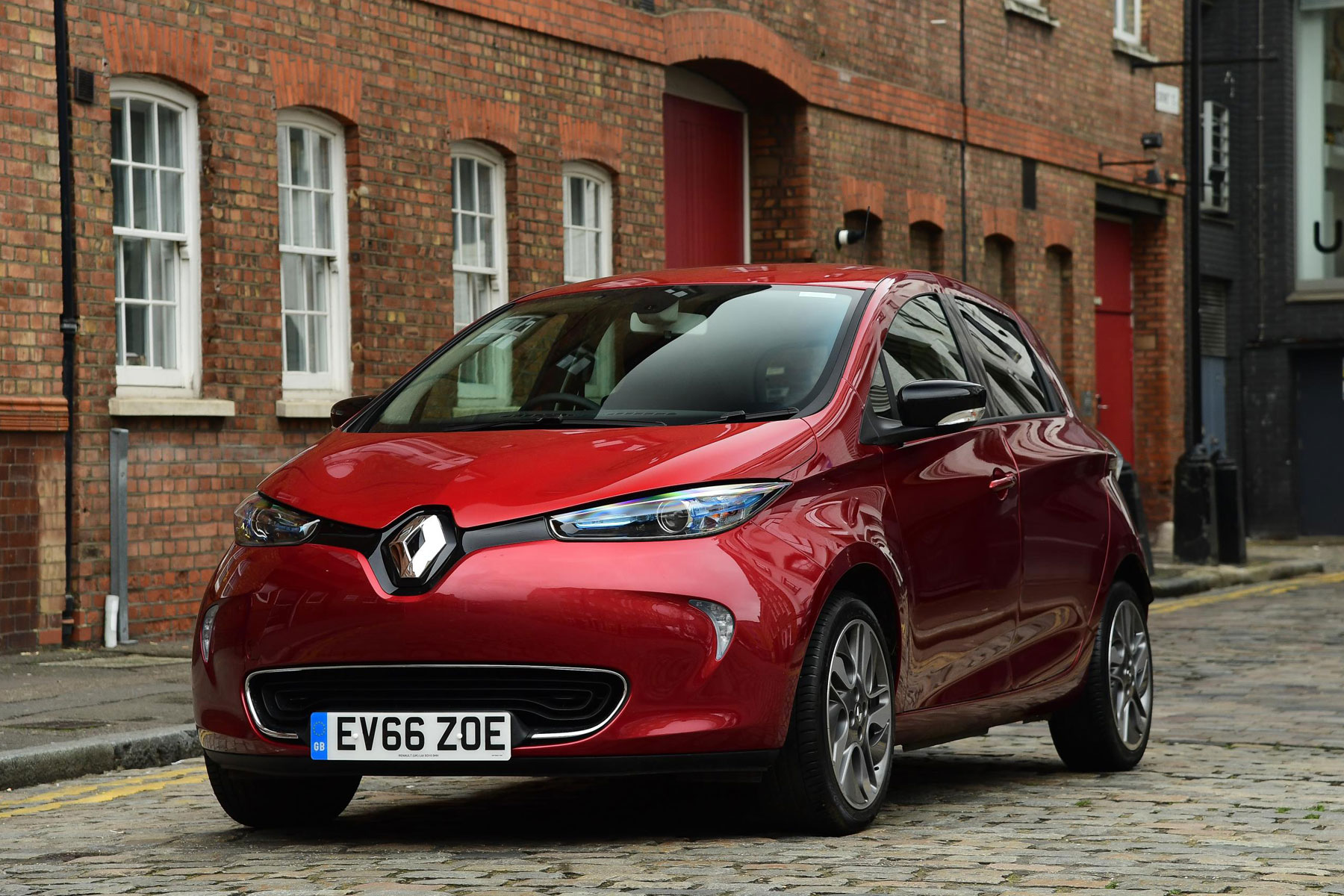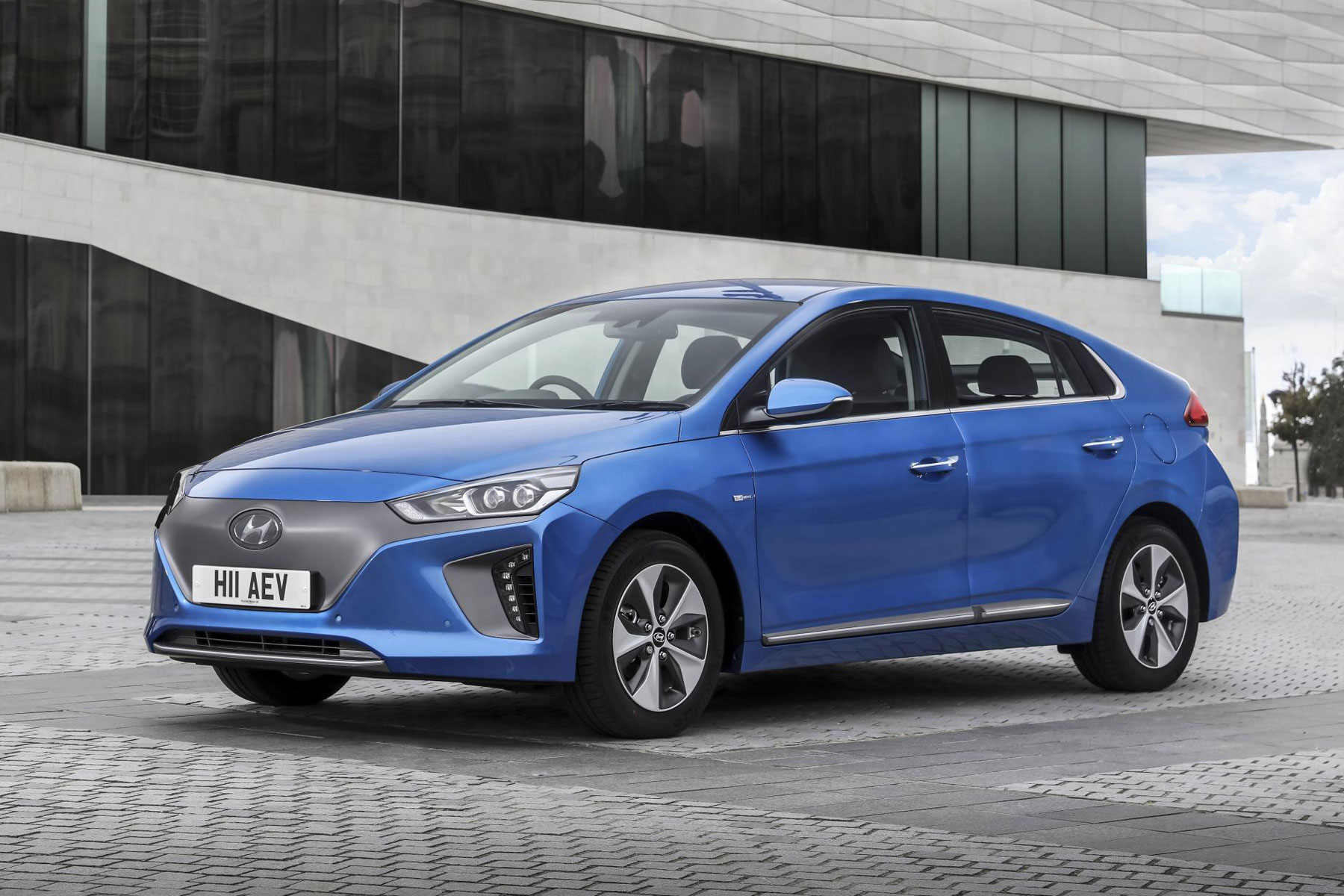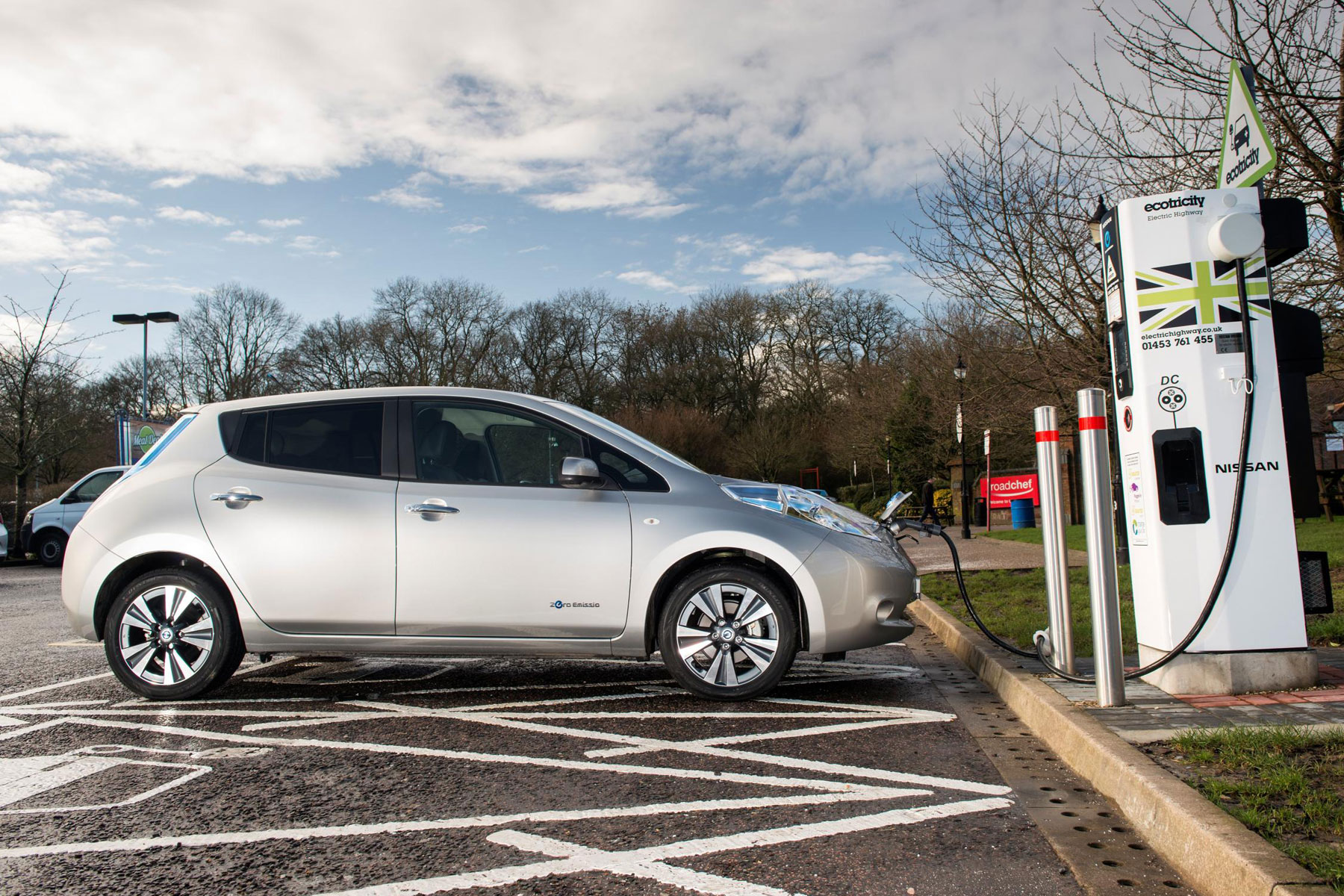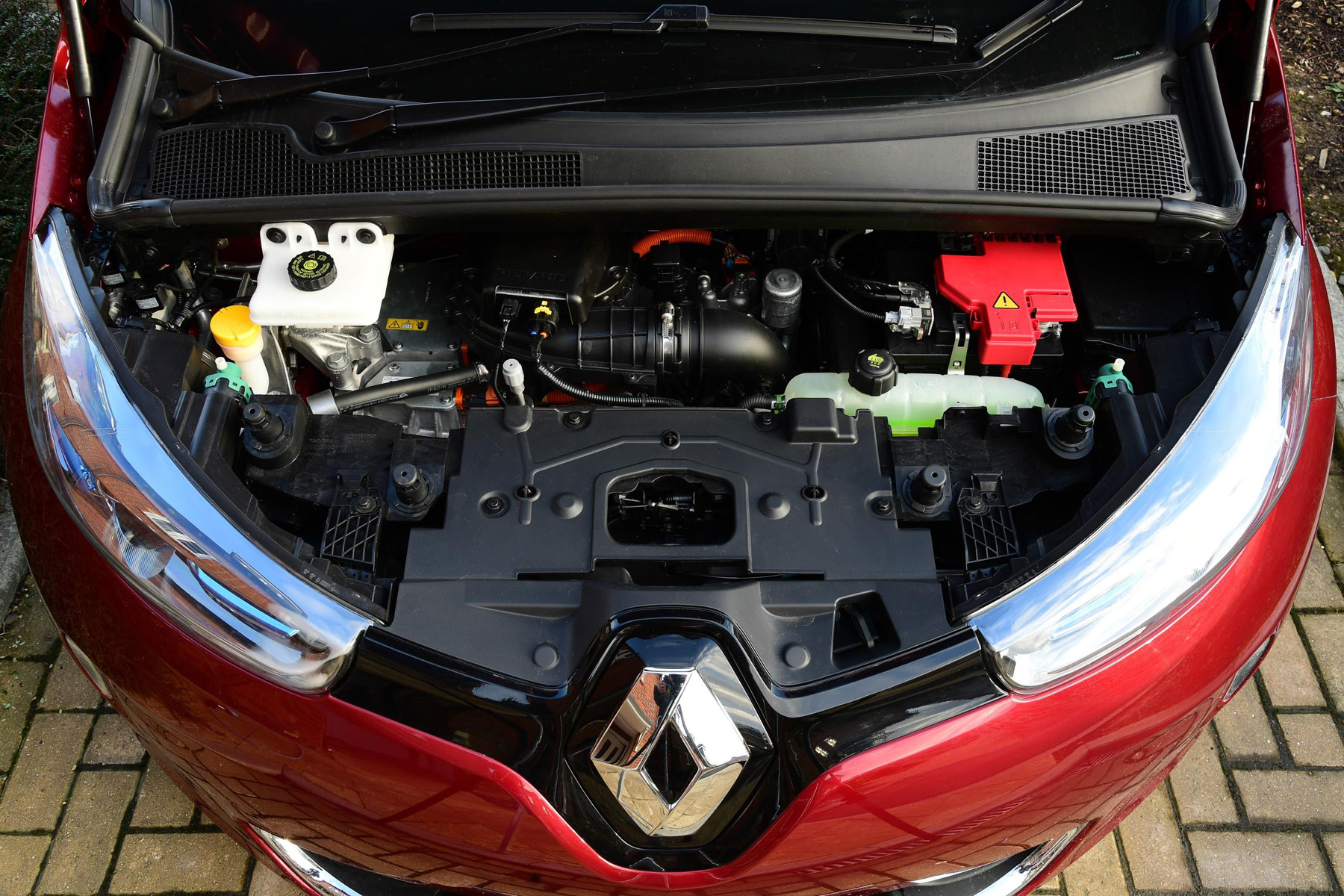
In a depressed new car market, electric cars are a rare beacon of hope for the carmakers. Year-to-date registrations are down 9.3%, but sales of alternative-fueled vehicles are up 41.0%.
Sales of pure electric cars are a significant factor, with registrations up 37.3% to 11,127 units by the end of September. All of which means electric cars are emerging from the shadows of petrol and diesel cars, switching from niche to mainstream.
The threat of anti-diesel legislation and concerns over public health have led to a backlash against diesel, which is fuelling a rise in the number of people considering an electric car. With this in mind, what do you need to know if you’re considering making the switch?
- London T-charge: everything you need to know
- Electric car chargepoints ‘will become law at petrol stations’
- Jaguar E-Type Zero: the EV E-Type electric classic
What is an electric car?
The electric vehicle is nothing new. In fact, electric cars date back to the late 19th and early 20th century, and electricity was once the dominant means of propulsion. For many people, the one and only experience of an electric vehicle is the sound of the milk float delivering fresh pints to our doorsteps.
But today’s electric cars are a far cry from the milkman’s chariot. The technology and infrastructure have moved on to such an extent, an EV makes practical sense for a large number of motorists.
An electric car is just that: a car that runs on electric power. An electric motor sources power from a battery, which can be recharged by plugging the car into a power source.
Is an electric car right for you?
As the technology moves on and the infrastructure continues to grow, there’s no doubt that an electric car is becoming a realistic prospect for a greater number of motorists. But there are some questions to be asked before you take the plunge.
Do you have access to a charging point?
Realistically, you’ll need to install a home charging point if you’re buying an electric car. The good news is that some manufacturers will offer a free charging kit as part of a finance package, while grants are available towards the cost of installing a charge point.
If you haven’t got access to a garage or parking space with access to a plug socket, an electric car will be a non-starter. Trailing a charging cable across a pavement is not a good idea, while carmakers advise against using an extension lead.
Alternatively, you could charge up at work, but if a charging point isn’t available at home or the office, we’d suggest an electric car isn’t for you. Not yet, anyway.
Daily commute
Once upon a time, 100 miles was the maximum range you could expect from an electric car, but cars like the Tesla Model S, and to a lesser extent, new versions of the Renault Zoe and Nissan Leaf are able to travel much further.
Even so, if your daily commute is further than 100 miles, we’d recommend a plug-in hybrid, rather than a pure electric vehicle. An EV is best suited for shorter commutes, trips to the station and predominantly urban use.
Budget
While you can buy a new petrol car for as little as £6,000, you’ll need to fork out at least £15,000 for an electric vehicle, and that’s before factoring in the cost of the battery.
And because EV technology is still relatively new, the used car market isn’t loaded with cheaper alternatives. More on this later.
Costs
Purchase price
Generally speaking, electric cars are more expensive to buy than their petrol or diesel counterparts, but the tide is shifting in favour of EVs. Taking the Renault Twizy quadricycle out of the equation, you’ll need to find at least £15,000 for a brand new electric car.
Looks good on paper, but be warned: the purchase price doesn’t necessarily include the battery, which will be leased on a monthly basis. For example, battery rental on the Renault Zoe costs from £49 to £110 per month, depending on spec and mileage. That adds between £588 and £1,320 a year.
You can purchase the battery outright on the Nissan Leaf, but it adds £5,000 to the purchase price, taking the cost of the cheapest Leaf 24kWh to £21,680. There are pros and cons associated with leasing or buying a battery – more on this later.
As a guide, these are the entry-level prices for electric cars on sale in the UK (correct as of October 2017):
Renault Twizy: £6,995
Renault Zoe: £14,245
Peugeot iOn: £15,995
Smart Fortwo Electric Drive: £16,420
Nissan Leaf 24kWh: £16,680
Nissan e-NV200: £19,403
Volkswagen e-Up: £20,780
Hyundai Ioniq: £24,995
Kia Soul: £25,495
Volkswagen e-Golf: £27,690
BMW i3: £29,570
Tesla Model 3: $35,000 (estimated)
Tesla Model S: £60,200
Tesla Model X: £66,000
Incentives

Government Plug-in Car Grant (PiCG)
The prices listed above include the government’s Plug-in Car Grant (PiCG), which is currently set at 35% of the purchase price, up to a maximum of £4,500. To qualify for the maximum (Category 1) grant, vehicles must emit less than 50g/km CO2 and be able to travel at least 70 miles on electric power.
Scrappage discounts
The threat of anti-diesel legislation has prompted many carmakers into launching so-called scrappage schemes, designed to encourage the purchase of cleaner vehicles. The deals can be more lucrative on electric and hybrid cars.
For example, Volkswagen is offering £5,500 off the price of an e-Golf when you trade in an old diesel vehicle. The saving is £3,300 on the e-Up and is in addition to the government’s plug-in vehicle grant.
Under Nissan’s ‘Switch Scheme’, owners of cars built before 2010 can claim up to £5,000 on top of the car’s trade-in value if they agree for it to be exchanged. It means that the Nissan Leaf is more affordable than ever.
But there’s more because Nissan is also offering a discount on an approved-used Leaf. Buyers will receive up to £2,000 on top of the trade-in value and a special three-year, 3.9% APR PCP scheme to spread the payment. You could pay as little as £87 a month and receive a free home charging kit worth £279.
Vehicle Excise Duty (VED)
The new Vehicle Excise Duty (VED) tax bands, introduced in April 2017, eliminated the zero-rate of tax for all but the cleanest of vehicles. In fact, only zero-emissions vehicles are exempt from paying any tax.
That said, all cars above £40,000 pay a £310 annual surcharge for five years starting in year two, which affects the rate of tax for the Tesla Model S and Model X.
London Congestion Charge/T-charge
The London Congestion Charge is a £11.50 daily charge for driving a vehicle within the charging zone between 7pm and 6pm, Monday to Friday. This fee can be reduced by £1 a day with Auto Pay, which costs £10 to register per vehicle.
But worse is to come for motorists entering London, with a new Toxicity Charge (T-charge) for older, more polluting vehicles. From 23 October 2017, vehicles that don’t comply with the Euro IV exhaust standard as a minimum will be charged £10 for entering central London.
This means that, in effect, all vehicles registered before 2006 will have to pay to enter central London, with the T-charge on top of the Congestion Charge. Electric cars are exempt from both fees: a potential saving of £21.50 a day.
The T-charge will be in force until the Ultra Low Emission Zone is introduced in 2019.
With politicians and local authorities seeking to clean up our urban areas, you can expect other towns and cities to follow the London lead. Soon, zero- or low-emissions cars might be the only vehicles welcome in city centres.
Buying a used electric car
With the electric car in its infancy, you’re not exactly spoilt for choice when it comes to buying a used EV. At the time of writing, only 744 of the 450,000 or so cars for sale on Auto Trader were electric, of which 696 were used or nearly new.
You’ll also need to factor in the cost of battery leasing, especially if buying a Renault electric vehicle, as 95% of the French firm’s EV product has a leased battery. Conversely, only 5% of Nissan Leaf product featured a battery purchased on a lease.
If the used electric car includes a battery purchased outright, there’s the worry of how well it keeps its charge. If the battery is past its best, the cost of replacement could be enormous, and as the car gets older, more than the vehicle is worth.
Battery: lease or purchase?
For most people, leasing a battery makes more sense, as it removes any concerns about resale value or battery life. The charging infrastructure and limited range mean that many electric cars cover limited miles and the tariffs tend to reflect this.
We’ve provided examples based on two versions of the Renault Zoe.
Renault Zoe 22kWh
Up to 4,500 miles: £49 per month
Up to 6,000 miles: £59 per month
Up to 7,500 miles: £69 per month
Up to 9,000 miles: £79 per month
Up to 10,500 miles: £89 per month
Renault Zoe Z.E 4.0
Up to 4,500 miles: £59 per month
Up to 6,000 miles: £69 per month
Up to 7,500 miles: £79 per month
Up to 9,000 miles: £89 per month
Up to 10,500 miles: £99 per month
Unlimited: £110 per month
Based on a three-year contract at 10,500 miles per annum, a Renault Zoe Expression Nav 22kWh will cost £14,245 to buy and £3,204 in battery hire, providing a total cost of £17,449. Bought outright, the cost would be £19,845.
When leasing, Renault will provide a battery performance guarantee to at least 75% of its original capacity. If it drops below 75%, Renault will repair or replace the battery. When buying outright, Renault will provide a guarantee of eight years or 100,000 miles, as well as guaranteeing the battery to at least 66% of its capacity.
Charging

Charging an electric car can be done at home, at work or at a public charging point. According to Zap-Map, there are currently charging points at 4,887 different locations in the UK, providing a total of 7,535 devices and 13,971 connectors.
These figures are up from 4,003 devices and 10,839 connectors in November 2016, which proves that the infrastructure is catching up with demand. But the overall figure tells only half the story: what’s just as important is the type of charger available at any given location.
There are three types of charger available in the UK: Slow, Fast and Rapid. These can be summarised as follows:
Slow chargers (3kw)
As recently as five years ago this was the most common type of charging point in the UK, but today, the slow charger is in the minority. The clue is in the name: a full charge could take anything between six and 12 hours. Most electric cars are supplied with a charger allowing you charge using a standard 13-amp three-pin plug.
A slow charger is best reserved for charging overnight when at home or during the day at the office. A home charging point is recommended, with some carmakers incentivising purchases via a free home installation.
Fast chargers (7-22kw)
You’ll find fast chargers in supermarket car parks and shopping centres, or somewhere an electric car can be left for a more extended period of time. A 7kW charger will recharge an EV in 3-5 hours, while a 22kw charger could complete the job in less than a couple of hours.
Today, the fast charger is the most common charging point in the UK, with 7kW home chargers the norm for electric car households, especially those with 80-100A supplies.
Rapid chargers (43, 50 or 120kW)
A rapid charger can provide up to 80% of charge in just 20-40 minutes, making them ideally suited to motorway service stations.
Chargemaster – the self-proclaimed ‘biggest name in electric vehicle charging’ – could install a charging point at your home within two weeks, with prices starting from £279 for a 3kW charger. Its entry-level Homecharge point is 60% faster than a 13A plug.
A 7kW charger is three times faster than a 13A plug and costs £354, while a 22kW charger – 10 times more rapid than a 13A plug – costs £1,200. The Homecharge points are suitable for indoor and outdoor use and covered by a three-year warranty.
Cost of charging
According to Pod Point, it’ll cost around £3.64 for a full charge when charging an electric car overnight at home. Assuming a typical range of 100 miles, that equates to less than 4p per mile.
Many public charging points remain free, although you’ll have to pay for rapid chargers, such as those found at motorway service stations. Similarly, while Tesla offers free access to its Supercharger network for Model S owners, it will introduce ‘pay per use’ charging on the Model 3.
Ecotricity claims that its electric vehicle charging network is the ‘most comprehensive in Europe’, featuring around 300 electric charging points. Each charging session costs 17p per kWh of electricity used, plus a £3 connection fee.
Polar – the UK’s largest EV charging network – provides access to 5,000 public charging points via a subscription service. The first three months’ membership is free, after which you pay £7.85 per month, which provides access to all charging points, 80% of which are free to use.
Pod Point suggests budgeting £6.50 for a 30-minute rapid charge at a motorway service station.
Range
The range you can expect from an electric car is dependent on the battery, the time of year and the style of driving. For example, the driving range will drop considerably in colder weather. Renault estimates up 186 miles in the summer and 124 miles in the winter for the Zoe Z.E. 40.
As an overview, here are the official New European Driving Cycle (NEDC) figures, as provided by the manufacturers. In all cases, you’re unlikely to achieve the claimed figures.
Peugeot iOn/Citroen C-Zero: 93 miles
Volkswagen e-Up: 93 miles
Smart Fortwo Electric: 96 miles
Nissan e-NV200: 106 miles
Nissan Leaf 24kWh: 124 miles
BMW i3: 124 miles
Kia Soul EV: 132 miles
Renault Zoe 22kWh: 149 miles
Nissan Leaf 30kWh: 155 miles
Hyundai Ioniq: 174 miles
Volkswagen e-Golf: 186 miles
BMW i3 33kWh: 195 miles
Tesla Model 3: 220-310 miles
Renault Zoe Z.E. 40: 250 miles
Tesla Model X 75D: 259 miles
Tesla Model S 75D: 304 miles
Tesla Model X P100D: 336 miles
Tesla Model X 100D: 351 miles
Tesla Model S P100D: 381 miles
Tesla Model S 100D: 393 miles
Servicing and maintenance

A pure electric car has three main components – the motor, the charger and the inverter – which meaning servicing and maintenance is much more straightforward and cheaper than on a petrol or diesel car.
Using data from KeeResources, Go Ultra Low published cost comparison information for electric cars versus their petrol and diesel equivalents. The data – based on four years and 60,000 miles – is quite telling:
BMW i3: £2,264.05 (total maintenance)
BMW 118d: £2,929.94
Cost saving for EV: £665.89
Hyundai Ioniq: £1,543.20
Hyundai Ioniq h-GDi: £2,120.88
Cost saving for EV: £577.68
Kia Soul EV: £1,203.57
Kia Soul GDI: £1,570.86
Cost saving for EV: £367.29
Volkswagen e-Golf: £1,730.69
Volkswagen Golf GTD: £2,965.29
Cost saving for EV: £1,234.60
In all cases, the cost-saving needs to be balanced with the initial outlay, which tends to be higher for an electric vehicle, but it proves that maintenance and servicing should be easier to manage.
Warranty
Electric vehicles typically have between five and eight years’ warranty on the electric motor and battery components. For the rest of the car, the length of warranty depends on the manufacturer – ranging from three years and 60,000 miles to seven years and 100,000 miles.
The battery guarantee will also depend on the manufacturer. For example, Renault will guarantee performance to at least 85% of its original capacity, or pay for repair or replacement, when you lease the battery. If you’re buying outright, the battery is covered for eight years or 100,000 miles, along with a performance guarantee to at least 66% of its original charge capacity.
As the technology improves, batteries are becoming more robust. Owners forums are a good place to discover real-world experiences of EV owners. For example, we discovered that a Tesla Model S will retain between 90 and 95% capacity, even after 93 miles. After 150,000 miles, only 15% capacity will have been lost.
Safety
Euro NCAP conducted the first crash test of an EV in 2011 when the Mitsubishi i-MiEV was awarded a four-star rating. Other EVs have since been tested, but it’s worth noting that a Euro NCAP test in 2017 is more rigorous than the equivalent test in 2011.
Here’s a list of pure electric vehicles tested by Euro NCAP, together with the date tested and star rating:
Five stars
Hyundai Ioniq (2016)
Tesla Model S (2014)
Renault Zoe (2013)
Nissan Leaf (2012)
Four stars
BMW i3 (2013)
Kia Soul EV (2014)
Citroen C-Zero (2011)
Peugeot iOn (2011)
Mitsubishi i-MiEV (2011)
Renault Fluence: 4 stars (2011)
Three stars
Nissan e-NV200: 3 stars (2014)
Latest electric car news
In what is seen as a significant step forward for electric cars in the UK, Shell is to install vehicle charging points at its petrol filling stations.
Drivers will be able to recharge 80% of their battery in 30 minutes at forecourts in London, Surrey and Derby, with a further 10 service stations to feature rapid chargers by the end of the year.
“There’s no doubt the electric vehicle market is developing fast. And we want to offer customers choice: it doesn’t really matter what kind of vehicle they’re driving, we want them to drive into a Shell station, refuel in whatever capacity the fuel is,” said Jane Lindsay-Green, future fuels manager at Shell UK.
Meanwhile, the government has introduced a bill to make electric charging points mandatory at large petrol stations and motorway service areas.
The Automated and Electric Vehicles bills will double the number of charging locations in the UK, leading to multiple points at some of the busiest areas.
Transport minister, John Hayes, said: “We want the UK to be the best place in the world to do business and a leading hub for modern transport technology, which is why we are introducing the Automated and Electric Vehicles Bill in Parliament and investing more than £1.2 billion in the industry.
“This bill will aid the construction of greater infrastructure to support the growing demand for automated and electric vehicles as we embrace this technology and move into the future.”